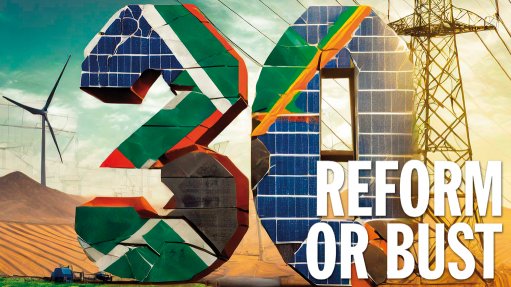South Africa needs to adopt strategic water plan to avoid deteriorating supply
South Africa’s water crisis is having a significant impact on economic growth and on the wellbeing of South African citizens, Department of Water and Sanitation DDG Trevor Balzer said on Monday.
Addressing delegates at the Consulting Engineers of South Africa Infrastructure Indaba, in Johannesburg, he said the water crisis facing the country was caused by insufficient water infrastructure maintenance and investment, together with recurrent droughts driven by climatic variation, deteriorating water quality and a lack of skilled water engineers.
He pointed out that 35% of South African citizens did not have access to reliable drinking water and that 14.1-million people did not have access to safe sanitation, while 41% of municipal water did not generate revenue.
“South Africa is facing a projected 17% water deficit by 2030 if it doesn’t adopt a ‘new normal’.
Achieving water security in the country requires a significant paradigm shift that recognises the limitations of water availability and the need for financial sustainability,” he said.
Balzer added that water availability could deteriorate rapidly as the country’s supply has contracted and demand escalated owing to growth, urbanisation, inefficient use, water losses and the negative impacts of climate change.
Based on projections, by 2030, the water deficit could be between 2 700-million and 3 800-million cubic metres a year, a gap of about 17% of available surface and ground water.
“A key issue is that agricultural consumption is largely unmetered, and there are also concerns about unauthorised abstraction and water waste in the sector. In addition, agricultural users pay a much lower tariff than other users of untreated water and the relatively cheap water has not incentivised the adoption of water efficient irrigation practices,” he said.
Balzer highlighted that average municipal water use in South Africa was around 237 litres per person per day, compared to the world average of 173 litres per person per day.
“Since large numbers of South Africans use very small amounts of water per day, this average masks the high water use by privileged sectors of the population. The high water use is partly owing to municipal, nonrevenue water which is currently at an unacceptably 41% high.”
He noted that municipalities were losing about 1 660-million cubic metres of water each year through nonrevenue water.
At a unit cost of R6/m3, this amounts to R9.9-billion each year, he said.
He pointed out that there was a significant opportunity to reduce water demand in the municipal and irrigation sectors.
“Water demand must be reduced by improving efficiency, adopting new technologies and reducing losses through water awareness and through strict regulation and incentives, while average domestic consumption must be reduced to 175 litres per person per day by 2025,” he stated.
On the supply side, he noted that there was a need to move from the current water mix, which was strongly dominated by surface water, with some groundwater and return flows to a water mix that includes increased groundwater use, together with water reclamation, desalination and treated acid mine drainage (AMD).
By 2040, Balzer said, treated AMD and desalinated seawater would make a significant contribution to South Africa’s water mix and the over‐reliance on surface water would be reduced.
“A multiyear, detailed schedule of actions is being developed for implementation for the period 2018 to 2030. This schedule of actions will be prioritised and refined in consultation with all stakeholders during the proposed mini‐Phakisa, scheduled to take place towards the end of August,” he said.
Comments
Press Office
Announcements
What's On
Subscribe to improve your user experience...
Option 1 (equivalent of R125 a month):
Receive a weekly copy of Creamer Media's Engineering News & Mining Weekly magazine
(print copy for those in South Africa and e-magazine for those outside of South Africa)
Receive daily email newsletters
Access to full search results
Access archive of magazine back copies
Access to Projects in Progress
Access to ONE Research Report of your choice in PDF format
Option 2 (equivalent of R375 a month):
All benefits from Option 1
PLUS
Access to Creamer Media's Research Channel Africa for ALL Research Reports, in PDF format, on various industrial and mining sectors
including Electricity; Water; Energy Transition; Hydrogen; Roads, Rail and Ports; Coal; Gold; Platinum; Battery Metals; etc.
Already a subscriber?
Forgotten your password?
Receive weekly copy of Creamer Media's Engineering News & Mining Weekly magazine (print copy for those in South Africa and e-magazine for those outside of South Africa)
➕
Recieve daily email newsletters
➕
Access to full search results
➕
Access archive of magazine back copies
➕
Access to Projects in Progress
➕
Access to ONE Research Report of your choice in PDF format
RESEARCH CHANNEL AFRICA
R4500 (equivalent of R375 a month)
SUBSCRIBEAll benefits from Option 1
➕
Access to Creamer Media's Research Channel Africa for ALL Research Reports on various industrial and mining sectors, in PDF format, including on:
Electricity
➕
Water
➕
Energy Transition
➕
Hydrogen
➕
Roads, Rail and Ports
➕
Coal
➕
Gold
➕
Platinum
➕
Battery Metals
➕
etc.
Receive all benefits from Option 1 or Option 2 delivered to numerous people at your company
➕
Multiple User names and Passwords for simultaneous log-ins
➕
Intranet integration access to all in your organisation





















